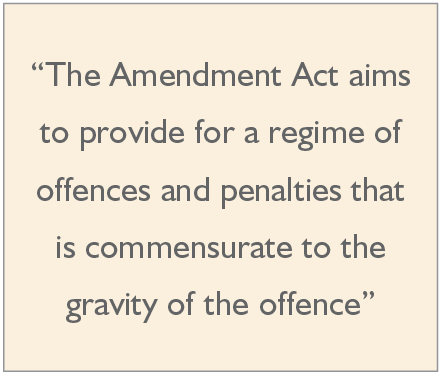 By Neetika Ahuja and Vasudha Luniya, Clasis Law
By Neetika Ahuja and Vasudha Luniya, Clasis Law
E: neetika.ahuja@clasislaw.com
E: vasudha.luniya@clasislaw.com
With the assent of the President on January 3, 2018, the much-awaited Companies (Amendment) Act, 2017 (Amendment Act), which provides for simpler provisions but stringent penalties, has finally seen the light of the day. The changes will facilitate ease of doing business, result in harmonisation with the Securities and Exchange Board of India (SEBI) and the Reserve Bank of India (RBI) and rectify certain omissions and inconsistencies in the Companies Act, 2013 (2013 Act). The new legislation is very vast, therefore this article focuses on certain changes brought by the Amendment Act.
Alteration in definitions
With a view to focus on control or participation in taking business decisions, as opposed to the share capital held by a person in the company, the definitions of “associate company” and “subsidiary company” determining the relationship between companies has been amended.
In the definition of “associate company”, the term “significant influence” has been amended to mean control of at least 20 percent of the total voting power, or control of or participation in taking business decisions under an agreement. The definition of the “subsidiary company” has been revised and the criteria of determining the holding and subsidiary company relationship would now be based on the total voting power being by a shareholder as against the stake in the total share capital.
A new definition of “joint venture” has also been introduced meaning a joint arrangement, where parties have joint control of the arrangement and have rights to the net assets of the arrangement.
Related party transactions
In light of the amendment to the definition of related party, a body corporate (which includes a foreign company) that is a holding/subsidiary/ associate/fellow subsidiary of an Indian company would come within the ambit of related party. Therefore, all offshore relationships will now be subject to related party compliances. This will provide additional protection to private equity and other investors in case related party transactions are carried out without their consent.

Private placement of securities by a company
The section on private placement has been completely revamped. The concept of “identified persons” has been introduced. The revised section provides that a company cannot utilise the monies raised through private placement unless such return of allotment is filed. Further, under the Amendment Act, a company would be allowed to make offer of multiple security instruments in each class to the identified persons.
Loans to directors
To address the difficulties being faced in genuine transactions due to the complete embargo on providing loans to subsidiaries with common directors, the companies are permitted to give loans to entities in which directors are interested after passing a special resolution and adhering to the disclosure requirements.
Harmonisation with RBI and SEBI
Sections of the 2013 Act, which dealt with insider trading and forward dealing, have now been omitted since the SEBI regulations are wide enough to cover all instances of such frauds. Further, definition of “debenture” has also been amended to allow RBI to disqualify certain instruments as debentures.
Corporate social responsibility
With a view to address the practical difficulties arising in determining the applicability of corporate social responsibility (CSR) on a company, the Amendment Act replaces the words “during any financial year” with the words “during the immediately preceding financial year”. Hence, based on the net worth/turnover/net profit of a company calculated during the immediately preceding financial year, the applicability of CSR on a company would be determined.
Rationalising penal provisions
The Amendment Act aims to provide for a regime of offences and penalties that is commensurate to the gravity of the offence. The size of the penalty shall now be levied taking into consideration, among other things, the size of a company, the nature of its business, injury to public interest, nature and gravity of default and repetition of default.
Conclusion
The Amendment Act while rationalising and streamlining certain provisions, also initiates strict actions and penalties against the defaulter companies as well as in cases of non-filing of balance sheet and annual return every year, which will act as deterrent to shell companies. Further, facilitation of ease of doing business and achieving better harmonisation with other regulations such as those made under RBI and SEBI is also envisaged.
E: neetika.ahuja@clasislaw.com
E: vasudha.luniya@clasislaw.com
T: (91) 11 4213 0000
F: (91) 11 4213 0099



